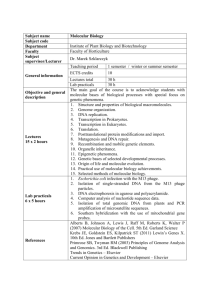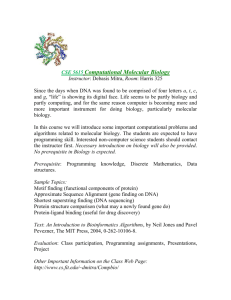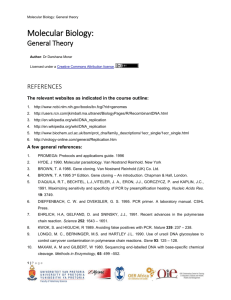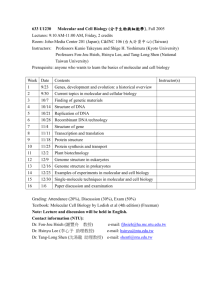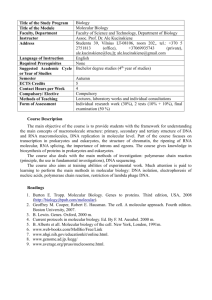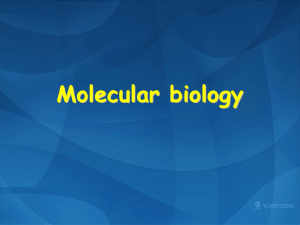Molecular Biology BIOSC 250/251 Shoreline Community College
advertisement
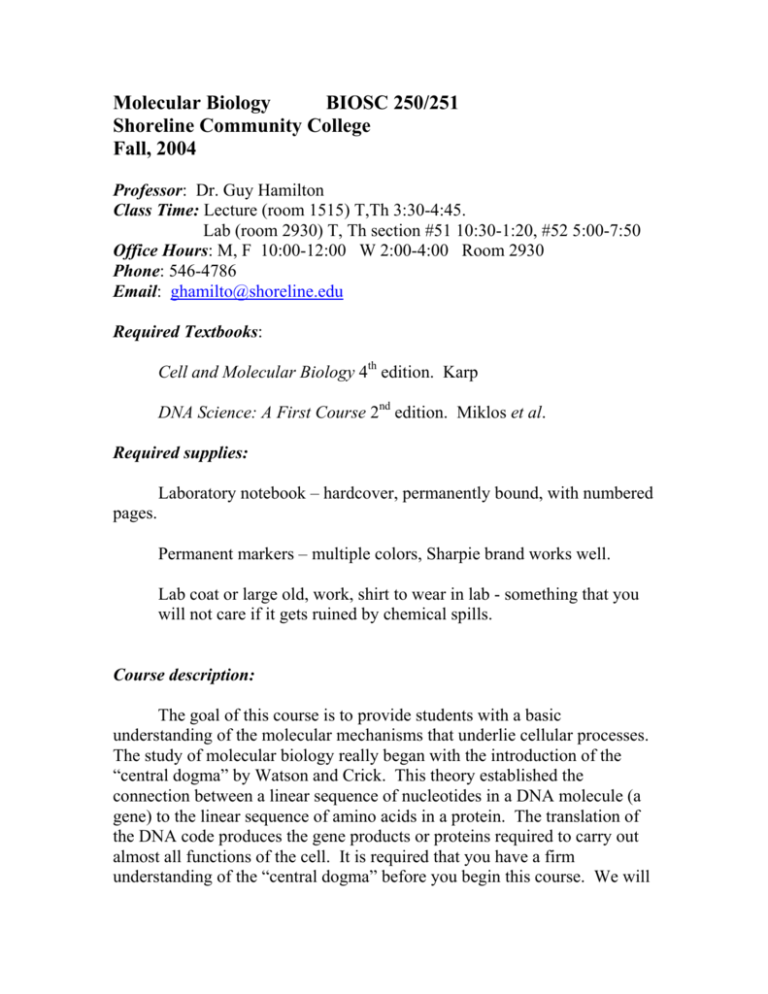
Molecular Biology BIOSC 250/251 Shoreline Community College Fall, 2004 Professor: Dr. Guy Hamilton Class Time: Lecture (room 1515) T,Th 3:30-4:45. Lab (room 2930) T, Th section #51 10:30-1:20, #52 5:00-7:50 Office Hours: M, F 10:00-12:00 W 2:00-4:00 Room 2930 Phone: 546-4786 Email: ghamilto@shoreline.edu Required Textbooks: Cell and Molecular Biology 4th edition. Karp DNA Science: A First Course 2nd edition. Miklos et al. Required supplies: Laboratory notebook – hardcover, permanently bound, with numbered pages. Permanent markers – multiple colors, Sharpie brand works well. Lab coat or large old, work, shirt to wear in lab - something that you will not care if it gets ruined by chemical spills. Course description: The goal of this course is to provide students with a basic understanding of the molecular mechanisms that underlie cellular processes. The study of molecular biology really began with the introduction of the “central dogma” by Watson and Crick. This theory established the connection between a linear sequence of nucleotides in a DNA molecule (a gene) to the linear sequence of amino acids in a protein. The translation of the DNA code produces the gene products or proteins required to carry out almost all functions of the cell. It is required that you have a firm understanding of the “central dogma” before you begin this course. We will begin by exploring the mechanisms utilized by cells to regulate expression of genes or production of proteins. Then we will study the mechanisms by which proteins transmit information within the cell and between cells (Signal Transduction). Ultimately the goal will be to provide you with an understanding of the process by which mutations in DNA can lead to the production of a protein with altered characteristics, resulting in the formation of disease states such as cancer. The laboratory portion of this course will provide you an opportunity to get hands on training with some of the most basic, yet widely utilized techniques in modern molecular biology labs. You will be judged on your ability to complete experiments with precision. This is not to say that if your experiment fails you will also fail, on the contrary, perhaps the most important aspect of working in a biotech lab is to be able to diagnose the problem if your experiment did not work. This will require critical thinking and precise note-taking, both of which can be exhibited in your laboratory notebook. What is required of you? 1) Attendance The level of material presented in the lecture course is fairly advanced and the best way to ensure your success is to attend lectures. The textbook for this class is best used as a reference to help you understand topics presented in the class. I do not lecture straight from the book, so it will be difficult to grasp everything I present in the lecture simply by reading the textbook. It is even more important to be able to attend labs. It will not be possible to make up labs at a later date and you cannot switch lab sections for even one week. You will not receive any credit for missed labs and each lab you miss will result in a deduction of 10% of your lab grade. The lab experience is a critical portion of this course which requires that you perform the experiments with your own hands. Also, you will be working closely with a lab partner and it would be unfair to make your lab partner to perform experiments for you. Finally, some of the labs run for multiple days, so missing one day can result in your inability to complete multiple labs. If you already know that you will miss more than a week of classes this quarter, be aware that this will have a severe impact on your grade, and you might be better off taking this course at a later date. 2) Grading – subject to change at the instructor’s discretion Because of the interconnected nature of the lab and the lecture course your final grade will be based on your performance in both classes. It will break down as follows: 3 Lecture exams 50% 2 Lab quizzes 10% Laboratory Notebook 25% (2 inspections) Group project 15% (oral presentation and written report) There will be 3 lecture based exams which will be worth 50% of your final grade. Each exam will focus on the material covered up to that point, however, because all topics in the course build on one another, every exam will essentially be cumulative. In other words, if you do poorly on the first exam, it benefits you to go back and learn that material, because those topics will be the building blocks for topics introduced in the remainder of the course. There will be 2 lab quizzes which will require you to understand not only how the procedures are performed but also the concepts involved. Laboratory notebooks must be maintained by every student and will be collected for grading twice during the quarter. They will be judged on how well experimental data is presented, results are interpreted, and questions (assigned by the instructor) are answered. The group project will involve students working in pairs (assigned by the instructor) to produce an 15 minute oral presentation and 3-4 page written report on a current research paper in the field of molecular biology. You will discuss the goals of the research project, the hypothesis, the experiments performed, and the interpretation of the results in context of the original hypothesis. The grade received will be based on both the oral and written components of the project and both students in the group will receive the same grade. Lecture Topics and Important Dates The following table lists the major topics which will be covered in the Molecular Biology Lectures in the approximate order of presentation. The readings indicated provide the background material for each of these topics. You should consider the textbooks as resources to supplement the lecture material. I will not have time to present all the material within these chapters. At the end of each week of class I will post a summary file of the topics presented in the lecture and study questions. Lecture Topics What is Molecular Biology? Central Dogma – flow of information from DNA to Protein Readings Micklos Chapter 1, 2 and Karp Chapter 11 Chemistry for Molecular Biologists Karp Chapter 2 and 3 Biological Macromolecules and membranes, Proteins structure = function, folding Karp Chapter 2, 4 DNA structure and Gene/ Genome organization Cell Structure and Organelles and Protein Sorting Extracellular Matrix Karp Chapter 10 and 12 Karp Chapter 7, 8 Cell Signaling – Signal Transduction, Growth factors and Apoptosis Karp Chapter 15 Cell Cycle, Mitosis, Meiosis, and Recombination Karp Chapter 14 Regulation of Gene Expression Prokaryotic and Eukaryotic Miklos Chapter 3 and Karp Chapter 11 and 12 Cancer Biology Chapter 16 Miklos Chapter 7 Exam and Assignment Due Dates EXAM #1 -Tuesday, Oct 19 EXAM #2 - Tuesday - Nov 9 FINAL EXAM - Tuesday - Dec 14, 3:30pm Lab Quiz #1 and Lab Notebook Inspection - Oct 28 Lab Quiz #2 and Lab Notebook Inspection - Dec 7 Group Project paper selection – Oct 28 Group Project written report – Nov 16 Group Project oral presentations – Nov 30, Dec 2, and Dec 7 Tenative Lab Schedule Fall 2004 Week of Sept 25 Tuesday Lab Micropipettor Exercise – Lab 1 (Micklos) Protocol assigned for Genomic and Plasmid prep (Lab 12 Micklos) and Competent cells (Miklos Lab 10) Thursday Lab Make solutions required for DNA preps (G and Plasmid) and competent cell protocol Inoculate 10 ml cultures for Bacterial Gro (Background in Miklos Chapter 4) Oct 4 Bacterial Growth Curves (inoculate cultures on Monday afternoon or Tuesday early AM) Make competent cells (Lab 10A Micklos) Chromosomal DNA prep Bacterial DNA mini-prep isolation (Lab 1 Oct 11 Oct 18 Group Project Intro (cont.) Restriction Digest Mapping Experiment – Lab 3 (Micklos) Oct 25 Set up Ligations (Lab 9 Micklos) Restriction digests to identify the GFP plasmid Nov 1 Screen Amp/Kan transformants – minipreps Begin Lab 7 – Micklos, GFP expression and purification – pick colonies and inoculate O/N cultures Make needed buffers for Lab 7 Group Project Intro DNA quantification of Plasmid and Chrom Preps DNA standard curve Double Digests of Amp and Kan plasmids Micklos) Agarose Gel Purification of correct fragm Transformations of Amp/Kan ligations an plasmids (Lab 9 Micklos) Turn in Lab Notebooks Lab Quiz #1 GFP purification using HIC resin (Lab 7 c Analysis of Amp/Kan transfromants Nov 8 Analysis of GFP prep using SDS - PAGE No Lab – Veteran’s Day Nov 15 Complete GFP prep PCR – Primer design and sequence analys NCBI database Nov 22 Nov 29 Dec 6 PCR PCR analysis Lab Quiz 2 Turn in Lab Notebooks No Lab - Thanksgiving TBA No Lab
